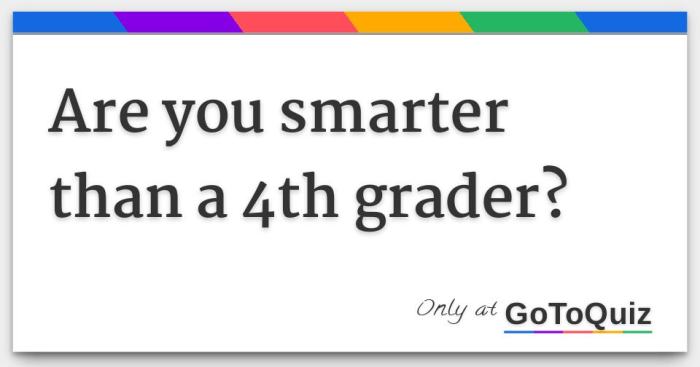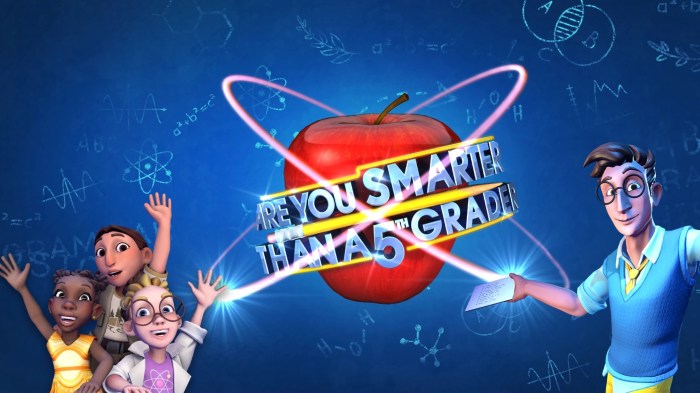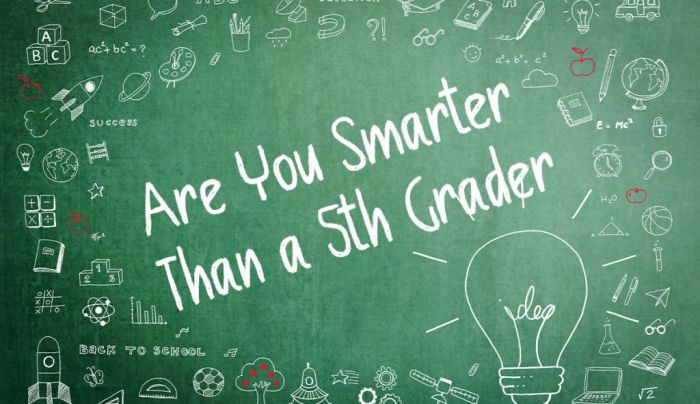Are you smarter than a 12th grader questions and answers – Embark on an intellectual journey with “Are You Smarter Than a 12th Grader?” questions and answers, a format that has captivated audiences worldwide. Designed to challenge your cognitive abilities and expand your knowledge, these questions offer a unique opportunity to test your wits and explore the depths of your understanding.
Delving into the structure, cognitive skills assessed, educational value, and cultural impact of these questions, this discussion will provide a comprehensive analysis of their significance in the realm of knowledge and intellectual growth.
Question and Answer Format

The “Are You Smarter Than a 12th Grader?” format presents questions and answers in a standardized manner. Questions are typically structured as multiple-choice, with four possible answers. The questions cover a wide range of topics, including math, science, history, literature, and current events.
The answers are typically brief and concise, providing the correct response to the question.
For example, a question might ask, “What is the capital of France?” with the answer being “Paris.”
The difficulty level of the questions varies, with some being relatively easy and others being quite challenging. The range of topics covered ensures that the questions appeal to a wide range of audiences.
Cognitive Skills Assessed: Are You Smarter Than A 12th Grader Questions And Answers

The questions in the “Are You Smarter Than a 12th Grader?” format are designed to assess a variety of cognitive skills, including:
- Problem-solving: The questions often require test-takers to apply their knowledge to solve problems.
- Critical thinking: The questions encourage test-takers to think critically about the information presented and to evaluate the validity of different arguments.
- Analytical reasoning: The questions require test-takers to analyze information and draw conclusions based on the evidence presented.
The questions are designed to assess different levels of cognitive ability, from basic knowledge and comprehension to higher-order thinking skills such as analysis and evaluation.
Educational Value

The questions and answers in the “Are You Smarter Than a 12th Grader?” format can have significant educational value. They can be used to:
- Reinforce classroom learning: The questions cover a wide range of topics that are typically taught in schools, so they can be used to reinforce what students are learning in class.
- Promote intellectual curiosity: The questions can spark students’ interest in different subjects and encourage them to explore new topics.
- Provide formative assessment: The questions can be used to assess students’ understanding of a particular topic and to identify areas where they need additional support.
The questions can be incorporated into educational settings in a variety of ways, such as:
- As a review activity at the end of a lesson or unit.
- As a formative assessment to check for understanding.
- As a way to introduce a new topic and generate interest.
Cultural Impact
The “Are You Smarter Than a 12th Grader?” format has had a significant cultural impact. It has been featured in popular culture, including television shows, movies, and video games. The format has also been used in educational settings and has helped to shape public discourse about intelligence.
The format has influenced popular culture’s perception of intelligence. The questions are often designed to be challenging, and answering them correctly is often seen as a sign of intelligence. This has led to a perception that intelligence is something that can be measured and compared to others.
The format has also been used in educational settings. The questions can be used to assess students’ knowledge and understanding of a particular topic. The format has also been used to promote intellectual curiosity and to encourage students to explore new topics.
Detailed FAQs
What cognitive skills are tested by these questions?
These questions assess a wide range of cognitive skills, including problem-solving, critical thinking, analytical reasoning, memory, and comprehension.
How can these questions be used in educational settings?
They can be incorporated into lessons to reinforce learning, stimulate discussion, and promote higher-order thinking skills.
What is the cultural significance of these questions?
They have influenced popular culture, shaped perceptions of intelligence, and sparked discussions about educational standards.
